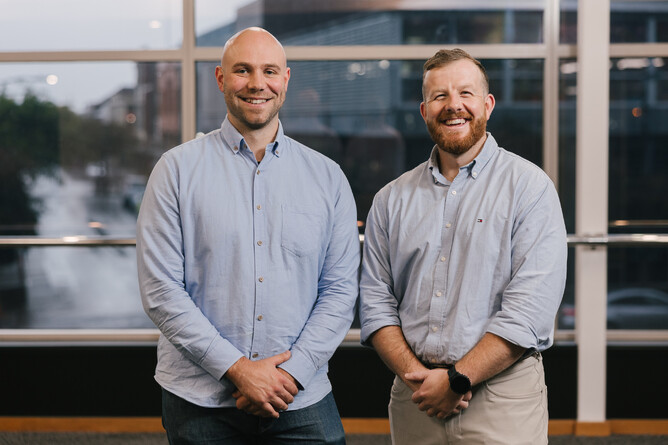New Zealand mussel farmers are working in the dark. Everything they do is below the surface, requiring skilled crew members to collect valuable data about the health of their mussels, quality of product and when and where to reseed.
Unlike above-ground farmers who work in the light, this results in a lack of scalability and a surveying and sampling bottleneck.
Now, there's an efficient and scalable solution.
Meet the founders of UWAI, Tim Rensen and Joel Steven. Together, they have built an underwater drone that uses artificial intelligence and advanced imaging to scan mussel farms — a solution that effectively turns on the floodlights so aquaculture farmers can see the status of their product.
Tim Rensen is driving the development of the drone and its capabilities with the backing of a capable team.They have been working on the technology for seven years at the University of Canterbury, and are now ready to spin out.
Joel has known Tim for several years and joined his team to help bring his innovation to life. With his project management background, he manages the venture's marketing, business, and sales.
UWAI's affordable drones are easy to use. They efficiently collect data and provide insights for mussel farmers such as when to reseed and harvest, and expected yield.
"Not only will they address industry problems, but they are scalable and will allow five, ten, and twenty-fold expansion in the next ten years," Joel says enthusiastically.
There is a tremendous opportunity for the industry to grow. "We were surprised to learn NZ's green-lip mussels exports are 1/4 the size of Chile's, by volume, but the value of our exports is greater because our product holds such a high value in the global market."
Getting into the accelerator was a highlight for the optimistic duo. They are eager to lean into Sprout for budget and business plan support and receive insight about potential pitfalls and advice.
Three weeks into the programme, the team is already finding its assumptions challenged - in a positive way. Their mentors ask confronting questions to ensure that the innovative technology Tim and Joel developed serves the correct market.
"It's good. Before we go any further, we need to determine if aquaculture is the best way to apply our technology. We are almost taking a step back to take a step forward. We need to find people to buy it so we need to give the customer what they want, not just what we think they should have."
Both men are inspired by Rod Drury from Xero, a businessman who started small, had a great product, and grew reasonably organically.
"He seems to have a good work-life balance and built something that became a household name. Like him, we are in it for the long haul."
This venture is more than just a short-term investment; for Tim and Joel, it's their chosen lifestyle. To them, success is building a well-performing, growing business that serves them and the world until they retire.
"Obviously, we want to start making sales and build a company, but we want to create something long-lasting that has a positive impact on NZ and the world," says Joel.
About Sprout: Sprout Agritech LP is an early-stage investor specialising in transformational technologies that impact how life on Earth is nourished and sustained. Through their Sprout Accelerator, they have helped grow more than 110 early-stage ventures within the agri and food industries, which have collectively gone on to raise over $60m in capital.

